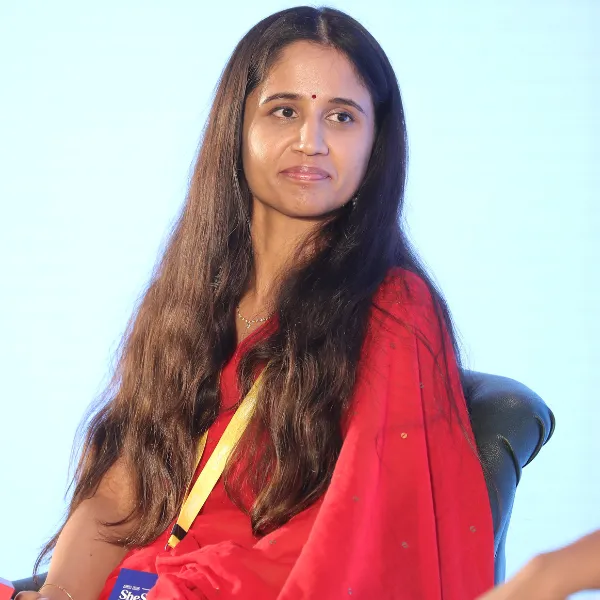At SheSparks 2024, women leaders in tech lead the way towards an equitable future
At the Women in Tech panel at SheSparks 2024, Teja Manakame, Goda Ramkumar, and Priyanka Swain threw light on the underrepresentation of women in the tech industry and how mentorship and sponsorship can play a huge role in sustaining women in the tech workforce.
According to data from Nasscom, women make up 36% of India’s tech workforce. However, their share in the workforce drops drastically as they start climbing up the ladder.
A Women in Tech Report by Skillsoft in 2022 pointed out that only 7% of women held executive-level positions, 13% worked in director-level roles, and 17% held mid-level managerial positions.
The stark contrast in these numbers stresses the need for more representation of women in tech to ensure gender equity–right from STEM education in primary schools and colleges to corporate boardrooms.

Goda Ramkumar
At SheSparks 2024, YourStory’s flagship event for women, three exceptional women leaders from the tech industry–Teja Manakame, Vice President (IT), Dell Technologies; Goda Ramkumar, Vice President, Data Science, Swiggy; and Priyanka Swain, Director of Engineering, Tally Solutions–spoke on this issue, as part of a panel discussion on 'Women in Tech: The Case of the Missing Demographic'.
They highlighted the under-representation of women in tech, how to combat biases to create an inclusive environment, and how their personal experiences have contributed towards driving innovation and creating a more equitable future.
Manakame has had a diverse career that began in the Indian Air Force. After the end of the commission, she joined the IT industry, which was on the cusp of a boom.
Reminiscing about her experiences in the Indian Air Force, which helped her navigate corporate life later, she said, “The whole experience is different from the corporate world I am in today. At the young age of 21, just out of college, you are learning to be an officer. The key learnings were discipline, integrity and teamwork. These are the important qualities that have helped me navigate a career in the corporate world."
She also believes technology should drive human progress.
Battling bias and social conditioning
While the number of women entering the tech workforce is heartening, sustaining them in the industry seems to be the major challenge.
Manakame said growing up, she always heard engineering was for men, and this bias seems to be carried forward as one grows up.
This is a bias women need to change and emphasise that technology is for everyone, she reiterated.
"Since we do not have many role models of women at the upper levels, that women can aspire to follow, we need to be the role models and encourage the younger generation to pursue their dreams and follow through,” she added.
Dispelling the misconception that technology is a difficult space to be in, Manakame said, "If you enjoy doing it, it’s not difficult. I have talked to many women at mid-career levels and reminded them it’s a transitional phase, and to stick to it, and move forward."
She also urged women to change the mindset that some people would like them to believe.
Ramkumar elaborated on the statement she had made in an interview earlier, where she pointed out that the one difference that stands out between men and women is maternity, which could be a "down period" for many since the feeling of catching up can be frustrating. She explained how organisations can foster an inclusive environment and not pander to traditional stereotypes around women.
She believes women grow up with social conditioning and their own expectations of themselves as a mother, leading to a lot of guilt–something she went through as well.
Recalling her experience, Ramkumar said, "I went to the person who was leading the site of the company and said I am only able to give only half of myself to the job, so why don’t we have a period where you only pay me half of my salary and I work half of the time and I will wrap up (the work) within three to four months. There was no policy at the time, but I was allowed to do it."
The underrepresentation of women in tech stems from various aspects, remarked Ramkumar. One factor is parents not being willing to send their girls away from their hometowns to study STEM. Another factor is maternity leave wherein women take a break before returning to work.
"Rely on an ecosystem of support both professional and professionally. Don’t be afraid to ask (for help). If people are not accommodating, it’s okay to make an alternate choice. Don’t feel guilty about it," she advised women.
Swain too encouraged women to ask for help from family or hire outside help to support them while they went out and faced the challenges at work.
She also talked of the 'superwoman syndrome' that women have to combat.
“We want to excel in everything we want to do, as a supermom, as a super worker, or as a super manager. We must understand we have limited time and limited energy and we must excel at what we do and what we are passionate about," she elaborated.
Edited by Swetha Kannan







